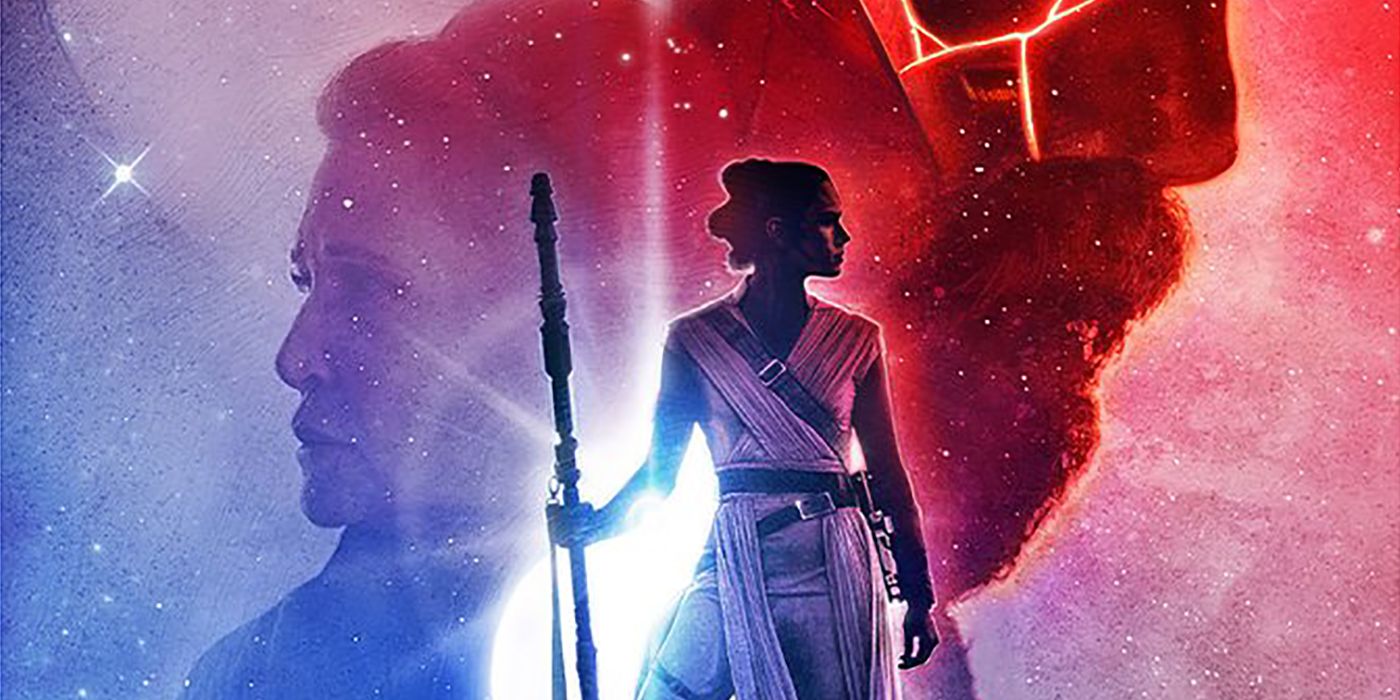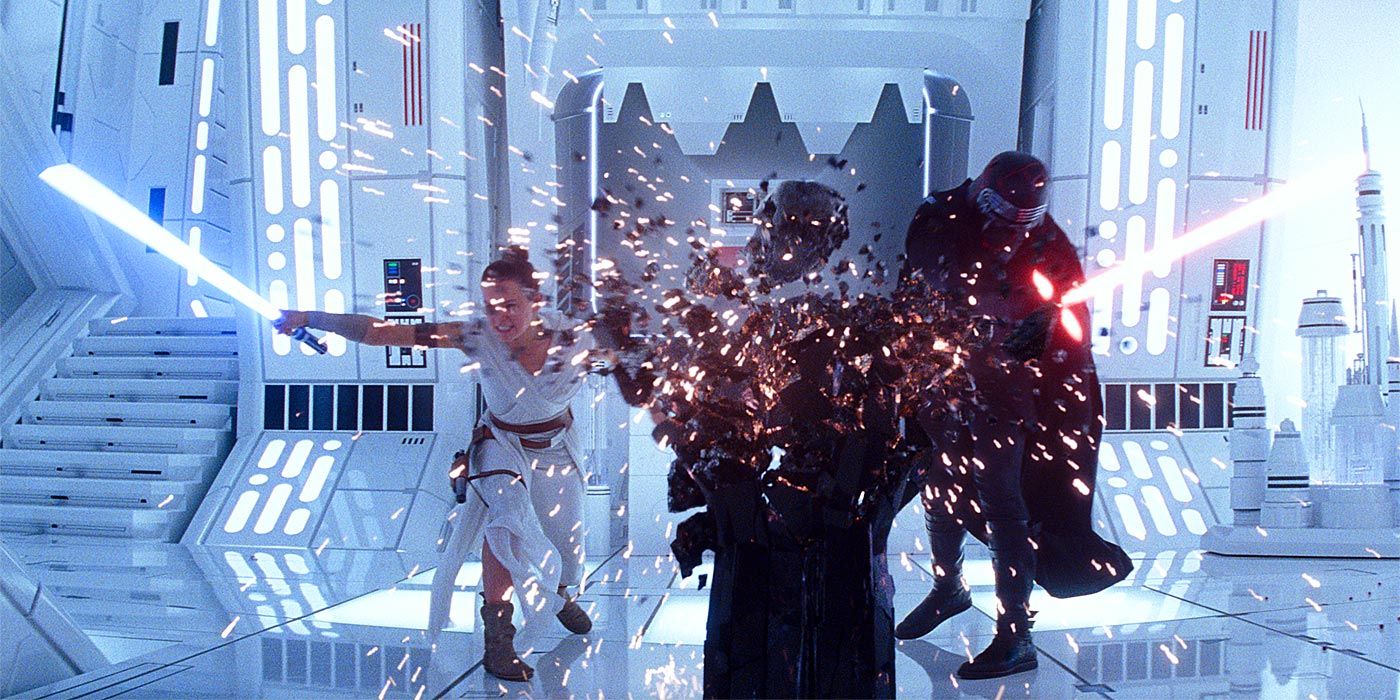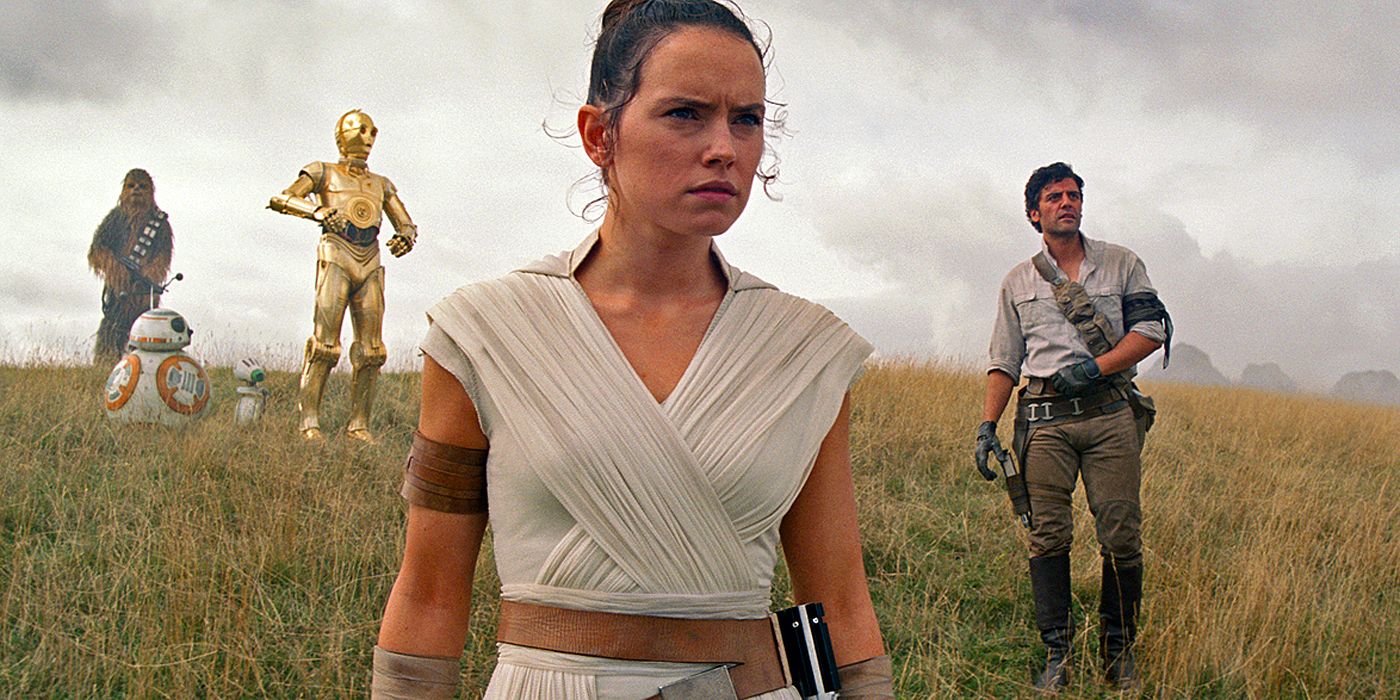WARNING: The following article contains major spoilers for Star Wars: The Rise of Skywalker, in theaters now.
There's no denying Rian Johnson's Star Wars: The Last Jedi remains controversial, with certain segments of the internet angered by, among other things, the film's increased focus on diversity, powerful heroines, and failure to live up to the fan theories provoked by the emphasis on "mystery box" storytelling by J.J. Abrams, director and co-writer of The Force Awakens. One of the biggest subjects of fan theories was the true parentage of Rey.
Johnson's 2017 film revealed Rey's parents as no one of particular note, with Kylo Ren telling her they sold her for drinking money. However, The Rise of Skywalker -- the latest film in the franchise -- reverses that twist, with Abrams and co-writer Chris Terrio undoing that choice entirely, instead making Rey a Palpatine.
At the start of the film, Kylo finds Emperor Sheev Palpatine, who -- for reasons never clearly articulated -- is alive after being thrown into a reactor and then having the massive space station he was on crash into a planet during Return of the Jedi, now with a massive army in the far reaches of the galaxy. Palpatine teases a revelation about Rey's parentage, and Kylo eventually reveals to her through one of their chats that she's, in fact, Rey Palpatine, the granddaughter of the Emperor.
However, that doesn't mean Kylo lied to Rey in The Last Jedi! Lying, an act entirely understandable for a Dark Side user, isn't what happened here. No, Kylo explains that Rey's parents sold her not for drinking money, but to protect her. Why they chose to abandon their daughter on Jakku rather than joining with the Rebellion dedicated entirely to fighting Palpatine isn't explained in the least.
Throughout the sequel trilogy, Rey has shown a knack for using the Force, quickly proving herself among the most adept users on the big screen. That, of course, resulted in detractors labeling her as a "Mary Sue," a term originally meaning "self-insert character" but now apparently referring to a woman showing competence at anything. Making Rey the descendant of Palpatine then serves as a justification for that power, with Kylo Ren at one point telling Rey, "You have his power," for those unable to make the clear connection that Rey is powerful because she's a Palpatine. She even uses Palpatine's signature (although not exclusive) Force lightning in a moment of anger.
Originally choosing to have Rey be outside of those bloodlines hammered home The Last Jedi's theme -- as emphasized in its final shot of a young slave using the Force to pull a broom towards him -- that one's origins don't matter. That's not what makes someone a powerful Jedi Master or a Sith Lord. Kylo sees Rey as an equal in strength not because of her bloodline, but because of her power and who she is. This communicates to viewers that their origins don't matter. What matters is the path one chooses and the will with which they pursue their ultimate aims. The Force definitely plays a role in this, but the mystical entity does not particularly care about family names.
In many ways, this issue of bloodlines starts with The Phantom Menace and midi-chlorians, an innate, empirical number that affects someone's ability to hear the Will of the Force and, thus, has at least some bearing on their power. As Qui-Gon Jinn asks Shmi Skywalker about the identity of Anakin's father, there's some implication that whomever he may be might, in some way, help to explain the boy's power, as he asks the question right after identifying the future Darth Vader as unusually strong in the Force. That, then, is impossible to divorce from each of Anakin's descendants being strong, because there is a clearly implied hereditary component.
Now, that isn't to say these bloodlines directly determine who will rank where in terms of ability. Star Wars features much the same power creep as many other franchises in which the new generation is stronger than the last, in order to raise the stakes. The sequel trilogy does account for some level of individual variance by having a character's journey directly affect just where they fall in the overall rankings. However, the most powerful users in the films are continually part of notable bloodlines and not randoms.
This lineage problem is less of an issue in supplementary content, such as the various animated series, which haven't had this problem in the same way. The prequel trilogy also does show a number of powerful Force users who do not seemingly come from one of those major bloodlines, as the Jedi are forbidden to have children. That may, in fact, be related to why the Jedi are not allowed to have children, as this would keep powerful bloodlines from flourishing and thus undermine any attempt at creating an aristocracy of the most powerful Jedi. Instead, the lack of bloodlines serves as something of an equalizer in this case.
As uncomfortable as it may be, The Rise of Skywalker, through Rey and Kylo, perpetuates notions of hereditary power that do play a role in our world. Looking outside even the obvious example of kings and queens, many of the biggest universities in the United States will privilege "legacy admissions," meaning the acceptance of the descendants of graduates. Those admissions exist at the expense of equally -- if not more -- talented students who are not the related to graduates. That isn't even to address the ability of those who have money to be able to do such things as buy placement for their children, as seen in the 2019 college admissions bribery scandal, further making sure their families have access to prestige and power for reasons outside of merit. This new aristocracy might not have formal powers, but it certainly has institutionalized advantages for reasons of birth.
The Last Jedi's choice to have Rey be no one asserts that powerful people can come from different backgrounds. The Rise of Skywalker reinforces ideas that power is in some way passed down through the blood. Rey's power coming from her lineage is legacy admissions for Star Wars.
One counter argument to this will be one of The Rise of Skywalker's biggest themes: breaking free of one's familial legacy. Rey chooses not to join the Dark Side, and instead adopts the name of a hero of the Light Side, which places her squarely in the camp of that family. However, the sequel trilogy already explores that theme with Kylo, as he struggles with his legacy as the grandson of Darth Vader and the son of Rebellion heroes.
The theme is much weaker for Rey than for Kylo, as she grew up without her family and only learns of their true background in The Rise of Skywalker. The question of The Rise of Skywalker is, then, if Rey is naturally evil for being a Palpatine, which is one the franchise has answered time and again with a resounding "no." The idea of someone not being their parents or grandparents was answered definitively when Luke did not turn to the Dark Side in the original trilogy. Rey's struggle with the Dark Side comes from a place of having been abandoned by her parents, not from being a Palpatine. That fight would exist regardless of Rey's lineage. The choice to even have her parents care enough to not let the Emperor use their daughter for his own ends answers the question immediately, as the child of Palpatine is, on some level, good. Or at least that's what The Rise of Skywalker thinks.
There will be more Star Wars films after The Rise of Skywalker, and those seem likely to go outside of the bloodlines that drove the Skywalker Saga. However, the problems of Abrams' decision to reveal Rey as a Palpatine are no less valid, as The Rise of Skywalker actively opts to unmake a creative choice that held a lot of power. Ultimately, a Skywalker rose at the end of the sequel trilogy, and because of that, everyone else fell.
Directed and co-written by J.J. Abrams, Star Wars: The Rise of Skywalker stars Daisy Ridley, Adam Driver, John Boyega, Oscar Isaac, Lupita Nyong’o, Domhnall Gleeson, Kelly Marie Tran, Joonas Suotamo, Billie Lourd, Keri Russell, Anthony Daniels, Mark Hamill, Billy Dee Williams and Carrie Fisher, with Naomi Ackie and Richard E. Grant.



